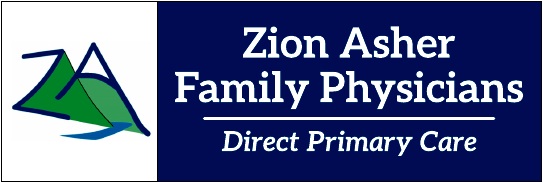Most families assume that as long as they have insurance, their healthcare needs are covered. But if you’ve ever waited weeks for an appointment, rushed through a 10-minute visit, or been surprised by an unexpected bill, you know that having insurance doesn’t always mean having access to great care.
That’s where Direct Primary Care (DPC) comes in. DPC isn’t a replacement for insurance—it’s a new way to experience healthcare that focuses on time, access, and a real relationship with your doctor.
What Is Direct Primary Care?
Direct Primary Care is a membership-based model that removes the insurance middleman. Instead of billing your insurance for each visit, you pay a simple monthly fee that covers most of your primary care needs—without copays, deductibles, or surprise charges.
At Zion Asher Family Physicians, your membership gives you:
Same-day or next-day appointments
Longer visits where you can actually talk through concerns
Direct text and phone access to your doctor
Upfront pricing on labs and procedures
Preventive, root-cause medicine that looks at the whole picture of your health
It’s healthcare the way it should be—personal, accessible, and focused on you.
Even With Insurance, DPC Saves Time and Stress
Insurance-based clinics often have to see a high volume of patients each day to stay afloat, meaning short visits and long waits. DPC flips that model. Because your doctor isn’t tied to insurance billing codes, they can limit the number of patients they care for and give each person the time they actually need.
That means:
No more waiting weeks for an appointment.
No rushed visits where you leave with unanswered questions.
No wondering if your concern is “worth making an appointment.”
Your doctor becomes accessible and approachable—like having a trusted medical partner on speed dial.
Better Health Comes from a Better Relationship
In the traditional system, doctors spend more time on paperwork than on patients. In DPC, that changes. We focus on root-cause medicine—understanding the “why” behind your symptoms rather than just masking them.
That might mean exploring hormone balance, nutrition, sleep, or stress—things that aren’t always addressed in a quick insurance visit. When your doctor knows your full story, your care becomes more effective, more holistic, and more sustainable.
A Real-Life Example
Imagine you wake up with a sore throat and fever. In the insurance world, you’d call, wait days for an opening, and possibly end up in urgent care after hours.
In DPC, you can text your doctor directly, get a same-day visit, and have a plan in place within hours. No copay. No paperwork. Just care.
That kind of access doesn’t just save time—it can prevent ER visits, reduce stress, and help you get back to life faster.
DPC and Insurance: A Powerful Combination
We still recommend keeping insurance for emergencies, hospitalizations, or specialty care. Think of DPC as the foundation of your healthcare—your first call for almost everything day-to-day.
When paired with a high-deductible, health sharing or catastrophic insurance plan, DPC often provides the most cost-effective and comprehensive coverage.
The Bottom Line
Even if you have insurance, DPC changes everything about how you experience healthcare. It brings back what’s been lost in the modern system—time, trust, and true connection with your doctor.
At Zion Asher Family Physicians, we believe your care should be centered around you, not your insurance card.
Ready to experience the difference?
👉 Schedule a consultation and see how DPC can transform your family’s health.





